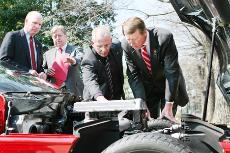N.C. Representative Bob Etheridge, Pa. Representative Tim Holden, representatives from the College of Engineering and the Advanced Vehicle Research Center examined an experimental Chevrolet Corvette Monday.
The engine was approximately half the size of the usual engine in a 1992 Chevrolet Corvette and has four cylinders compared to the V-8 in the original model.
The “Ethanol Corvette” makes 350 horsepower using the alternative fuel ethanol while the original gas-fueled engine produced 300 horsepower.
Richard Dell, executive director of the Advanced Vehicle Research Center, said that AVRC worked in conjunction with the University and the U.S. Department of Energy to make this car a possibility.
He said grants from FreedomCAR and NetLogic Microsystems Inc. provided the financial backing for the project.
“The ‘Ethanol Corvette,’ as well as a Pontiac G6 that is in the beginning stages of making the ethanol transformation, is part of the “moving pace of change in the automobile industry, which we haven’t seen in a long time,” Dell said.
Eric Poe, one of three students working on the “Ethanol Corvette,” said he also saw the merits of biofuel technology.
“[Biofuel is] an avenue to exhibit some pretty cutting-edge performance,” Poe, a senior in mechanical engineering said.
Rep. Etheridge, who spoke of his two-year service to the Renewable Fuel Task Force and the Democratic caucus’ push for biofuel as one of its six key issues this session in Congress, said he agreed.
Ethanol technological advancements are key to farmer and farming stability and energy independence for the future of the United States, according to Rep. Etheridge.
As this technology takes off, Rep. Etheridge and Dell said they see a bright future for N.C. and the University.
Rep. Etheridge said N.C. is a major player in biofuel technologies and is already beginning to leave its mark.
“With planning and the help of federal and state government, North Carolina could be the Saudi Arabia of biofuel,” Rep. Etheridge said.
Dell acknowledged the possibilities for the state as well.
“N.C. State has some recognizable strength and material to take a big role in automotive advancement … the College of Engineering has the experience in control programs to improve the field of mechanical engineering,” Dell said.
The red “Ethanol Corvette” was conceptualized and constructed through joint efforts of ARCV and NCSU.
ARCV provided the conceptual basis for the ethanol-run car and the hands-on labor was mostly completed by NCSU students, according to Poe.
He said the “Ethanol Corvette” should be road-worthy in about 10 – 12 weeks, but alternative fuels are not stopping at the Corvette and G6.
Wolfpack Motorsports’ Society of Automotive Engineering vehicle runs on E85, a fuel blend of 85 percent ethanol and 15 percent gasoline.
“If you are going to go green, you might as well look good doing it,” Dell said.








